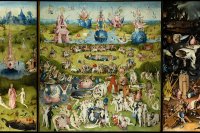“In sum, the struggle for our future is . . . the struggle between those who cling to patterns of domination and those working for a more equitable partnership world.”
— Riane Eisler
Recently, I’ve written a couple of essays about the present global situation. One of those essays focused on the sociocultural dysfunctions of America and the other elaborated how the 500-year history of Western colonialism and imperialism that birthed our modern world has rendered the “problems of America” inextricable from the problems of the human race.
I consider myself a collector of lenses—mental models I can employ at any time to make sense of the world and my place in it. Yesterday I happened to remember one such lens—a truly remarkable one, I think—that I overlooked in the aforementioned essays. Nonetheless, this lens seems to me a kind of keystone that further contextualizes and reinforces my arguments in those essays and has tremendous implications for the predicament we face in the present historical moment.

The Birth of Venus by Sandro Botticelli, 1483-85. Photo Credit: Public Domain
A Story of “Dominator” and “Partnership” Cultures
Riane Eisler, a world-renowned Austrian-born American systems scientist, writer, and social activist, has proposed that we ought to understand human cultures and societies in terms of two fundamental categories: “dominator” and “partnership.” In her landmark work, The Chalice and the Blade: Our History, our Future, she suggests that our conventional social categories—religious vs. secular, right vs. left, capitalist vs. communist, Eastern vs. Western, and industrial vs. pre- or post-industrial, etc.—are insufficient to describe the whole of a society’s values, beliefs, and institutions.
Eisler argues that these categories overlook the fact that, historically, many societies in all of the aforementioned categories have been unequal and violent, whereas some societies—the majority of which existed millennia ago—have been much more equalitarian and peaceful. Eisler points out that we lack a frame of analysis that encompasses the differences between these latter societies/cultures and the vast majority of societies/cultures that are prevalent today. Thus Eisler turns to the historical and archaeological record to argue that throughout human history, sociocultural systems have existed on a continuum between the extremes of “dominator” and “partnership” systems. A couple of passages from her website seem a worthy starting point for understanding the definitions and profound implications of these categories:
In the domination system, somebody has to be on top and somebody has to be on the bottom. People learn, starting in early childhood, to obey orders without question. They learn to carry a harsh voice in their heads telling them they’re no good, they don’t deserve love, they need to be punished. Families and societies are based on control that is explicitly or implicitly backed up by guilt, fear, and force. The world is divided into in-groups and out-groups, with those who are different seen as enemies to be conquered or destroyed.
In contrast, the partnership system supports mutually respectful and caring relations. Because there is no need to maintain rigid rankings of control, there is also no built-in need for abuse and violence. Partnership relations free our innate capacity to feel joy, to play. They enable us to grow mentally, emotionally, and spiritually. This is true for individuals, families, and whole societies. Conflict is an opportunity to learn and to be creative, and power is exercised in ways that empower rather than disempower others.
I’m guessing that you, like me, see your own society reflected in the description of the dominator system. Most societies existing today are paternalistic, disciplinarian, materialistic, and hierarchy-based. Judgment from peers, guilt over one’s actions, the threat of force, and fear of alienation or punishment are among the primary dictators of most people’s behavior. Groups of people are labeled, marginalized, and discriminated against based on surface-level characteristics.
Many people tend to believe that these sociocultural norms are simply an expression of “human nature” or just “how life is.” Eisler is offering an astonishing and radically different narrative. She’s turned to history, archaeology, anthropology, mythology, and other fields to conduct cross-cultural comparisons and argues convincingly that for the majority of the last ~37,000 years, humans lived primarily in partnership societies, in a global partnership culture—a state of affairs nearly unimaginable today.
For approximately 30,000 years, Eisler argues, partnership was the norm. She points to numerous societies across continents and throughout (pre-)history that appear to have been devoid of inequality in social relations and without war for many centuries at a time. These societies seem to have cherished the force that gives, rather than takes, life and worshipped the “Great Goddess,” a feminine deity representing fertility, nourishment, and the miracle of creation.
In part because of this recognition of the life-giving feminine, it seems that neither men nor women were considered superior or inferior to one another in these societies. Eisler holds that this most fundamental relationship—between man and woman—formed the basis for all other relationships and institutions in these societies, and thus that people were “linked” by their differences rather than considered “above” or “below” one another. Eisler argues that these various societies were representative of a many-millennia-spanning global trend toward partnership culture.
Rise of the Dominator
Around 5000 BC, though, a new model of social organization began to, well, dominate. In an exceptional article on Vice (highly recommended for further study of this topic) regarding Eisler’s work, Tao Lin explains Eisler’s findings:
“It wasn’t until ~5000 BC that the dominator model appeared in the form of “nomadic bands” from peripheral areas that attacked the preexisting civilizations, which were all partnership societies. Defense mechanisms like trenches and ramparts—previously nonexistent—gradually appeared. ‘These repeated incursions and ensuing culture shocks and population shifts were concentrated in three major thrusts,’ wrote Eisler, calling these ‘Wave No. 1’ (4300-4200 BC), ‘Wave No. 2’ (3400-3200 BC), and ‘Wave No. 3’ (3000-2900 BC). ‘At the core of the invaders’ system was the placing of higher value on the power that takes, rather than gives, life,’ observed Eisler. As the dominators conquered, they also began to suppress the old way of living, which meant suppressing worship of the Goddess, which meant the marginalization of women in general. The Goddess, and women, Eisler claimed, ‘were reduced to male consorts or concubines. Gradually male dominance, warfare, and the enslavement of women and of gentler, more ‘effeminate’ men became the norm.'”
Eisler argues that cultures based on domination arose somewhat spontaneously, probably during a period of relative chaos. This period may have been caused by rising populations, scarcity of resources, natural disaster, or a number of other possibilities. Partnership societies, unprepared in terms of both attitude and technology, were naturally conquered, destroyed, and suppressed by dominator peoples/societies.
The cause of the rise of the dominator system is less important than its implications for the world that would develop over the next 7,000 years (and still exists today)—a world in which the partnership model has been all but forgotten, in which war has become the norm, in which women, poor people, various races/ethnicities, and numerous other groups have been systematically subjugated and oppressed, in which the very possibilities of human life have been greatly restricted by the idea that everyone must “know his place” and submit to authority, or else.
Though the historical dominators have tended to be male (and more recently, on the global stage, white), Eisler holds that her theory of dominator/partnership cultures is not ideology-, gender-, or race-specific. In essence, any human has the propensity to dominate other humans under certain conditions. For Terence McKenna, an American philosopher who praised Eisler’s work, this was an important point:
“I don’t see it as a male disease. I think everybody in this room has a far stronger ego than they need. The great thing that Riane Eisler, in her book The Chalice and the Blade, did for this discussion was to de-genderize the terminology. Instead of talking about patriarchy and all this, what we should be talking about is dominator versus partnership society.”
McKenna, who famously coined the meme, “Culture is not your friend.,” also said this of Eisler’s work:
“Her position is that it is the tension between these two forms of social organization and the over-expression of the dominator model that is responsible for our alienation [from nature, from ourselves, and from each other]. I am in complete agreement with Eisler’s view.”
Re-Imagining
Indeed, Eisler argues that the dominator model of social organization permeates all aspects of life and experience, causing inconceivable pain, repression, and alienation that we take to be normal aspects of the human experience. She asserts that the only way to remedy this situation is to devise social structures and belief systems based on partnership instead of domination:
“We know the pain, fear, and tension of relations based on coercion and accommodation, of jockeying for control, of trying to manipulate and cajole when we are unable to express our real feelings and needs, of the tug of war for that illusory moment of power rather than powerlessness, of our unfulfilled yearning for caring and mutuality, of all the misery, suffering, and lost lives and potentials that come from these kinds of relations.
Most of us have also, at least intermittently, experienced another way of being, one where we feel safe and seen for who we truly are, where our essential humanity and that of others shines through, perhaps only for a little while, lifting our hearts and spirits, enfolding us in a sense that the world can after all be right, that we are valued and valuable.
Our human yearning for caring connections, for peace rather than war, for equality rather than inequality, for freedom rather than oppression, can be seen as part of our genetic equipment. The degree to which this yearning can be realized is not a matter of changing our genes, but of building partnership social structures and beliefs.”
For me, Eisler’s re-telling of history is marvelous and also deeply troubling. Ponder the implications of this work, and you’ll realize that the war, genocide, slavery, oppression, discrimination, and unbounded accumulation of material wealth that have characterized much of recorded history can be traced to this period ~7,000 years ago when the human race began to transition from partnership models of social organization to dominator models. That’s not to say that humans have ever been or could ever be totally non-violent—just that we could arguably be significantly more peaceful, free, and equal than we presently are.
Look around, and in every area of our societies—the family unit, the government, the military, the school system, religious institutions, business organizations—you will find hierarchy-based, authoritarian systems in which some people are considered to be “above” other people. Observe how people tend to interact with or talk about other people, and you will find gossip, judgment, belittling, and manipulation—constant leveraging for a fleeting sense of power and control. Think for a moment about how openly loving, caring for, and being kind to other people is often considered a sign of being “soft” or “weak,” whereas showing little affection, acting “macho,” and never needing another’s help or tenderness is glorified as the image of strength and heroism.
We are living on a planet in which the dominator model of social organization has become ubiquitous throughout most of the human race, shaping our fundamental assumptions about how to design institutions, how to act, and how to treat one another. This is a frightening and tragic situation that has driven our species to the brink of extinction and planetary destruction.
Thankfully, we seem to have managed at least temporarily to quell our urges to drop city-melting warheads on each other, and large-scale war may actually be disappearing. However, environmental catastrophes yet loom on the horizon, and, even if the disasters can be averted, who wants to live in a world where inequality, manipulation, conflict, exploitation, alienation, and violence are so commonplace that we often hardly notice them? Not this human.
Hope
We might be in luck, though. Eisler argues that the last three hundred years or so have seen a strong trend toward a re-discovery of partnership values, and that there may be hope for a kind of renaissance:
“The last three hundred years have seen a strong movement toward partnership. One tradition of domination after another has been challenged – from the rule of despotic kings and male dominance to economic oppression and child abuse.
But this forward movement has been fiercely resisted, and punctuated by periodic regressions. That is the bad news.
The good news is that we do not have to start from square one. Though we still have a long way to go, in bits and pieces the shift from domination to partnership is underway.
There is also strong evidence from archeology and the study of myth that the original direction in the mainstream of our cultural evolution was in a partnership direction. So much that today may seem new and even radical, such as gender equality and a more peaceful way of life, has ancient roots going back thousands of years, before the cultural shift toward domination about 5000 years ago.
During much of recorded history, rankings of domination – man over man, man over woman, race over race, nation over nation, and humans over nature – have been the norm. But in our time of nuclear and biological weapons and high technology in service of the once hallowed ‘conquest of nature,’ high technology guided by an ethos of domination could take us to an evolutionary dead end.
In sum, the struggle for our future is not between East and West, North and South, religion or secularism, capitalism or socialism, but within all these. It is the struggle between those who cling to patterns of domination and those working for a more equitable partnership world.
Each one of us can contribute to the partnership movement. We can change by example, education, and advocacy. We can shift our relations from domination to partnership – starting with our day-to-day relations all the way to how we relate to our mother earth.”
If you pause and reflect, you’ll note that in a little over 150 years, the United States has seen the end of slavery, the attainment of suffrage for all citizens, legislated equality for all genders and races/ethnicities, major strides toward legislated equality for all sexual orientations, paradigm-shattering environmental initiatives, and major steps toward the legalization of cannabis and a saner drug policy generally. The Occupy Movements have challenged systemic economic and social inequality worldwide, and in many places ideas such as universal health care, free higher education, and a Standard Basic Income have been implemented or are taking hold. I take these facts to be indications that a renaissance of partnership values is presently occurring on this planet—that the human race has begun collectively to realize that it now faces an ultimatum: cooperate with each other and the planet, or self-destruct.
Pushing this movement forward begins with each of us—with the day-to-day, unglamorous decisions we can make to treat people as equals, to show respect and kindness, to try to imagine the lives of others, and to openly express and demonstrate love and affection. We can have candid, gentle conversations with others about these ideas. We can support humanitarian projects and political reforms that aim for a more equal, compassionate, open, sustainable society. We can create videos, blogs, music, social media content, and other art or projects that challenge the status quo and contain messages of love and togetherness. The Internet can help us and might just be the supreme tool for greatly accelerating this transition/renaissance. In these ways, we can continue to re-orient the collective human enterprise away from division, inequality, alienation, and domination toward unity, equality, openness, partnership, and love.
If this process is indeed occurring and will continue to occur, it will be a slow one. We shouldn’t conceive of it as something that will occur in our lifetime, but rather, as a revival that began centuries ago and will continue indefinitely into the future. We must think in terms of what one special professor I was privileged to work with calls the “long now”—a term referring to the long-term resonances, amplifications, and ripple effects that can result from the smaller-scale work we are able to do in this moment.
Rather than feeling discouraged by the timescale of this reclamation of partnership values, we ought to feel privileged to be living in the midst of such revolutionary changes, to be working to re-direct several thousand years of cultural momentum, to be contributing to monumental and exciting changes in the human enterprise. Signs abound that this renaissance in human thinking is happening and accelerating, and I for one feel that contributing to its potency and reach is about the most important thing any of us can do.
If this was fascinating, subscribe and follow me on Twitter.
Note: This summary of Eisler’s work is necessarily reductive and incomplete. I tried to touch on the main premises of her argument, but I’ve hardly scratched the surface of her work. If this topic is of interest to you, I highly recommend further study. Start here:
About Jordan Bates
Jordan Bates is a Lover of God, healer, mentor of leaders, writer, and music maker. The best way to keep up with his work is to join nearly 7,000 people who read his Substack newsletter.





folks should comment because i’d love to have a conversation about this one. one of the more compelling arguments that i think one can level against eisler’s views goes something like this: okay, so maybe partnership cultures were widespread at one point, but it appears that dominator cultures arose a fairly short while after the agricultural revolution, which was about the time that the human population began to rise exponentially, so maybe dominator cultures are inevitable with large populations and limited resources? i’ll just let that argument hang and see if others want to pick up the thread or start… Read more »
No, domination cultures are not inevitable given the existence of large populations and limited resources. I think we have to look at the fact that these days (for those of us in developed/first world countries) domination culture is the result of a “scarcity mentality” rather than an actual state of scarce resources. There are a lot of factors that go into the perpetuation of the illusion of scarcity (i.e. the diverting of resources to the military, the diverting of resources toward non-sustainable energy practices, money spent in/on the entertainment industries, money circulating within the ranks of the financial elite, etc.),… Read more »
Jacki,
your commentary on this topic is extraordinary and adds so much to what i wrote. thank you for taking the time to leave such wonderful words. i would love for you to formalize some of this writing a bit more and publish it on Refine The Mind sometime!
I take issue with Jackie on this: “Now, I’m not completely convinced that the rise of domination cultures was purely the result of population growth and scarcity of resources, because I think a good bit of it had to do with gender dynamics and the fluctuation of power between matriarchal societies and patriarchal ones.” I totally disagree about her gender dynamics hypothesis. That wasn’t the problem for thousands of years until the invader cultures appeared. And, why were they invading? CLIMATE CHANGE The invaders were “herders”. The invaded were “agriculturalists”. Same type of struggle for land and resources that happened… Read more »
I’ll just note that birth rates tend to be lower in countries that have a stronger “partnership” culture (Western Europe and Canada). I suspect there is a causal link there (though I can’t prove it), because in a peaceful, sharing-based culture people are going to worry less about their future and thus have fewer children.
As low birth rates is key to long-term sustainability for mankind, this means that we need to change into a partnership culture in order to survive in the long term.
interesting point, Arnt. i’m not prepared to make too many claims about the correlation between low birth rates and partnership cultures, but it does make sense that more progressive societies, collectively aware of the dangers of overpopulation, would have fewer children. it’s also just darn expensive to have kids.
one word: “scarcity”. You already picked up on that with “limited resources”. Today we have unreal pressure for space,air, & water. This pressure works against a more gentle society. On the other hand, I concur, the Internet is a primitive form of “Mind-link”. Blogs can spread hate and nonsense, but they can also attempt to… make the world a nicer place. Extol feelings. (Hell, I submit I try on mine…)
While I agree wholeheartedly with the general sentiment, and I believe this is a useful way of looking at the historical development of humanity, I’m a little wary of oversimplification. Yes, it’s true that the general trend over the last two millennia has been toward greater domination. But I think think it’s important to ask the questions: “Who is dominating whom, and to what degree?” “How is oppression carried out? What tools to dominators use to oppress different groups?” “How have these mechanisms of domination transformed throughout our history?” Having the answers to these questions is an incredibly important first… Read more »
nick, thanks for bringing up a few of the ways in which this is an utterly incomplete analysis of the situation, haha. have you read any foucault? his “discipline and punish” came to mind in response to your question of “how have these mechanisms of domination transformed throughout our history?” . . . and if you’re looking at Western and/or American history, i think “the autobiography of malcolm x” and “a people’s history of the US” by howard zinn are great places to start answering those questions. it’s difficult, on the blog medium, to try to deliver big ideas and… Read more »
Ill jump in real quick and say that I think Eisler is retrieving (in a structurally resonant manner) an early metaphysical philosophy (that of Empedocles), which is a variation on earlier pan-human mythological archetypes (cosmic egg, among others), the function of which is to relate the macrocosm of world/history/experience into a coherent perception of integration with one’s environmental surround (thoughts and words corresponding to elements in the perceptible world in an intimate, dialogic manner). Empedocles cosmology, like Eisler, is a big-picture, holistic view of essential features of existence which undergird the functioning of social-natural order collectively: “although lacking the sense… Read more »
nick,
thanks for pointing out the parallels between eisler’s conception of history and the older mythological motifs that mirror her conception. the similarities are striking. as always, thanks for contributing.
Well, a man agrees… so she must be right. (rolling eyes)
I know I wrote a response to the prompt in the first comment, but I am starting another thread because there was actually another line of thought that this piece initially drew me towards. So, the Terence McKenna quote: “I don’t see it as a male disease. I think everybody in this room has a far stronger ego than they need. The great thing that Riane Eisler, in her book *The Chalice and the Blade*, did for this discussion was to de-genderize the terminology. Instead of talking about patriarchy and all this, what we should be talking about is dominator… Read more »
Nope, nope, sorry I’m writing way too much, but I can’t let this go. I’ve been studying and contemplating this topic for a really long time and I didn’t elaborate on my points well enough to fully express what I’m trying to convey. So, let me begin at the beginning. Towards the beginning of your article, Jordan, you said that men and women in partnership cultures were basically equal, that there was no sense of inferior and superior. I think this is close, but not entirely true. In the very early stages of human consciousness, our ancestors did not understand… Read more »
please don’t apologize! write this much all the time! this is a beautiful and thoughtful continuation of your other meditations. they’re all great, and i’d love for you to put them together and publish the piece on here, if you want. thank you, thank you, thank you for your groovy thoughts. 🙂
Why on earth did this happen? Why did the reverence for the female subside? “When the patriarchal religions of the dominator cultures replaced the Goddess with the male God, the female deities were demonized and women were blamed as the origins of sin.” – Jacki Where/when did the patriarchal religions come from? Excuse me if I’m just rehashing what I’ve just read. I submit that communities, societies and religions (cultures) of partnership became matriarchal dominator cultures. Were the men gathering and spreading the idea that they were being dominated, oppressed, powerless to effect their reality of life and death? I’d… Read more »
jacki, thanks for all of your thoughts on this. i agree that gender dynamics can not be dismissed just because we can speak in terms of dominator vs. partnership cultures. men do seem to have a higher propensity for domination, though i think a lot of it is culturally conditioned. i’ve come a long ways in terms of basically letting go of my impulses to assert my ego or to be overly competitive or to form in-groups and out-groups. i’m not sure how much of this stuff was culturally conditioned and how much was to some extent innate. i know… Read more »
This post reminds me of the book “Ishmael” by Daniel Quinn. He referred the dominator culture as “Takers” and the partnership as “Leavers”. If I recall correctly, there was a point in time where a human decided to take control of his own destiny in the world, rather than leaving it up to nature or the gods. When Man discovered such power, that was the beginning of a revolution of making things suit to his needs and as the population grew, the needs grew larger, spreading across lands like a disease. I am only beginning to scratch the surface of… Read more »
Matt,
great to hear. thanks for the generous praise and interesting comment. i’ve read “The Story of B” by Daniel Quinn, which explores similar ideas. definitely need to read “Ishmael.” Quinn was kind of the beginning of my exploring this broad topic as well, and yes, please do read Eisler’s book. these are ideas worth considering. take care, man.
I’ve skimmed this post and before I read it really in-depth, I wanted to comment that already I can tell it resonates full-well with me, being Filipino-American, and will resonate with many other hyphenated “-Americans.” The issues of alienation within ourselves and from each other. That’s a direct result of one part of my identity having domination over the other. Not to mention being raised in the Catholic church. Probably has an influence on why my extended family are split between the U.S and the Philippines, aside from the red-tape of immigration. I could go on. That said and despite… Read more »